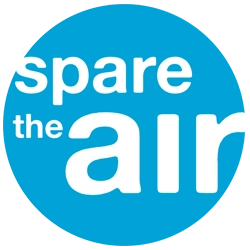
Spare the Air is a non-profit organization that helps to improve air quality in the Bay Area by informing residents about air pollution levels. They encourage people to take action like using public transport, carpooling, or working from home to reduce car emissions on bad air days to keep the air healthy for everyone.
COMPANY LINKS
TAGS
Updated 1 year ago
How woke is Spare the Air?
Introduction
The Bay Area Air Quality Management District (BAAQMD) launched the Spare the Air program over thirty years ago. Its primary goal is to reduce air pollution by encouraging the public to change their habits on days when air quality is particularly poor. Sounds straightforward, right?
But as we dig deeper, it becomes clear that Spare the Air isn’t just about clearing the skies—it’s also deeply entwined with climate change advocacy and social justice. This raises an important question: Is this program genuinely focused on improving air quality, or has it become yet another vehicle for promoting a woke agenda?
Financial Contributions to Progressive Causes
Spare the Air has strong ties to progressive environmentalism. The program consistently pushes for climate justice, a concept that combines environmentalism with social equity. By advocating for policies that specifically target pollution in marginalised communities, Spare the Air aligns itself with broader social justice movements. It’s clear that this intersection of climate action and social equity positions the program within the realm of progressive activism.
Furthermore, the program’s partnerships with various government and non-governmental organisations reinforce its commitment to advancing a progressive environmental agenda. These collaborations, often focused on sustainable transport and urban planning, suggest both financial and ideological support for progressive causes.
Prioritisation of DEI Policies
The Spare the Air program emphasises addressing air quality issues in communities that have historically been underserved or disproportionately affected by pollution. This focus on environmental justice is a key component of the DEI narrative, which argues that certain communities should receive more attention due to past and present inequities.
Mandatory Training Sessions
There is no publication of Spare The Air engaging its employees or customers in mandatory training on unconscious bias and critical race theory. Either it does not exist, or it is not made public.
Support for LGBTQ+ Initiatives
Spare The Air’s involvement in LGBTQ+ initiatives is not published. Either it does not exist, or it is not made public.
Marketing and Branding
When it comes to marketing and branding, Spare the Air doesn’t shy away from making a statement. The program’s campaigns are infused with messages of social justice and climate activism. They often highlight how air pollution disproportionately impacts marginalized communities, framing environmental issues within the broader context of systemic inequality. This messaging strategy aligns with the goals of climate justice, which seeks to address both environmental degradation and social inequities simultaneously.
Conclusion
In conclusion, Spare the Air is more than just an environmental program—it’s a prime example of the intersection between environmental activism and progressive social justice. While its efforts to improve air quality and address environmental inequities are commendable, the program’s alignment with a broader woke agenda raises important questions about its priorities.
By emphasizing DEI policies, mandatory training sessions on critical race theory, and intersectional activism, Spare the Air may be losing sight of its original mission. For those who value traditional environmentalism focused solely on improving air quality, the program’s expansion into social justice territory might seem like a detour from its core mission.
Our rating is based
